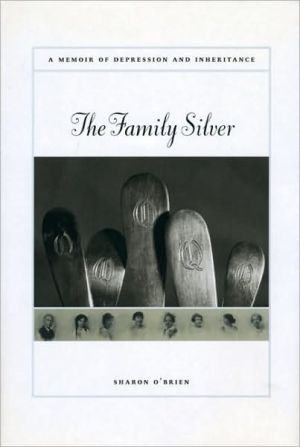

 |

|

The average rating for Family Silver: A Memoir of Depression and Inheritance based on 2 reviews is 5 stars.
Review # 1 was written on 2007-12-05 00:00:00 Gerald Leite Gerald LeiteI just finished The Family Silver: A Memoir of Depression and Inheritance by Sharon O'Brien. It's very, very good. The book is partially O'Brien's memoir, partially a memoir of the last three generations of her Irish-American family, and partially a book about depression, both in general and O'Brien and her family's specific experiences. This medley of subjects work perfectly. O'Brien ties her own depression not only to her upbringing, but to genetic inheritance, and makes a strong case for these things being intertwined. She moves back and forth between herself, each of her parents, her siblings, and her more distant relatives, as well as moving geographically between Ireland and several towns in Massachusetts and update New York, weaving a seamless tale that is both enlightening and heartbreaking. Sharon O'Brien is a professor of English, specializing in Willa Cather (about whom she wrote a biography I am now anxious to read). She's suffered from depression and anxiety since childhood, as do her parents and as did their parents. O'Brien, however, has the distinction of being a member of a generation that has begun to recognize depression as an illness that can be (at least in most cases) treated, rather than a personality problem. Because of this, she's able to distance herself from her depression enough to write about it, and to look back at the history of depression in her family as well. O'Brien also has the distinction of not being self-hating due to her depression, or feeling too guilty for having the help she's had when her relatives (including and especially her father) did not. And her book is much better because of it. In general, I am not crazy about the way people write about depression. Their experience does not correspond with mine enough for me to feel solidarity, and then I feel guilty for thinking they are whining, or for not being as sick as they are. O'Brien, however, tells her story in a way I can relate to, and tempers her personal depression anecdotes with a fascinating family history, which makes the whole thing go down much easier. I'd highly recommend this book to those who are depressed, have been depressed, have depressed family members, or are just interested in Irish-American family life in early 20th century to mid-century America. Or just those who dig a well-written memoir. |
Review # 2 was written on 2017-08-17 00:00:00 Laura Bollinger Laura BollingerThis book resonated deeply for me as an ex-academic who grew up with high expectations for academic success and struggled with depression of varying severity from my early teens to present. I always knew the ideas of success and class mobility I grew up with were intimately tied to my depression but O'Brien is the first to validate this connection so clearly. The only other memoir I know of that considers the classed dynamics of depression in America (and which includes an analysis of race as well) is Ann Cvetkovich's Depression: A Public Feeling, which cites O'Brien's book and is also excellent. I loved O'Brien's exploration of her inheritance of depression through her family's history of famine, poverty, immigration, upward class mobility, and then her father's fall from grace. I loved the book's richly rendered detail: how she lets us into poignant moments in her unfolding of this history. Her writing wraps you up, a blanket of pictures and emotion. I empathized with her story, so much so that I found it difficult to persist with the book, and as a result, it's taken me over a year to finish it. It took me back to the hardest days of my life, and what they felt like. I appreciated O'Brien's nuance in refusing to choose between biological and biographical roots of depression; however, her stark defense of the biomedical model and medication in her chapters "Depressives in the Lounge" and "Recovery Stories," seemed at odds with her lyrical, beautiful writing in her accounts of her history, her family's history, and their ties to her depression. Her insistence that medication is crucial for the treatment of depression also seemed at odds with her repeated admissions that the medication isn't working or hasn't worked for her. She never claims a recovery narrative as most memoirs of depression do. She rather seems to imply that medication takes the edge off the depression, so to speak, but she never says this directly. It also struck me as odd that as far as she reports, in none of her encounters with other "unipolar" and "bipolar" compatriots does she meet anyone more critical of psychiatry, anyone who's experienced horrendous and even life-threatening medication side-effects, as so many have, including myself. It's not that I feel terribly invested in whether she takes meds or not. I am willing to believe they help some people, including O'Brien, despite the fact that she never specifies in what ways they are helping her. It's just that I would have liked to see more of the nuance she brings to the rest of the book applied to her uncritical celebration of medication, which she recommends for all depression sufferers under the reasoning that she's combating a "fierce cultural resistance to medication" (265). In my experience there is much more resistance to a depressed person not taking medication, though admittedly this may be a more recent development in our culture of "mental health awareness." Despite this one criticism, The Family Silver is a book that touched me deeply and I am sure to read passages of it over and over again. |
CAN'T FIND WHAT YOU'RE LOOKING FOR? CLICK HERE!!!